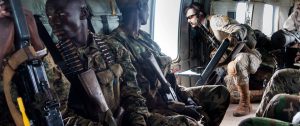The deaths of three Green Berets near the border with Mali show just how entrenched American security forces are in Africa, like reported by theatlantic.com
In 2002, just months after the attacks of September 11, the Bush administration launched the Pan Sahel Initiative, a counterterrorism program in which the U.S. worked with the militaries of Chad, Mali, Mauritania, and Niger to track down criminals and terrorists in the region. Over the next several years the program expanded to include more countries, ultimately getting subsumed into a new military command called Africom, created in 2007. Changes notwithstanding, what has remained constant since U.S. troops entered the region 15 years ago is their numbers have grown even while terrorist groups have continued to operate.
In 2005, Robert D. Kaplan visited Niger to study the U.S. counterterrorism effort in the region. He wrote in The Atlantic:
The countries of the Sahel—which runs through Senegal, Mauritania, Mali, Burkina Faso, Niger, Nigeria, Chad, and Sudan—are among the world’s poorest and most unstable, with some of the highest fertility and lowest quality of life anywhere. Governments have little control beyond their capital cities, and throughout the region are many of the ingredients that breed terrorists and their sympathizers: a population disillusioned with its political leadership; a dangerously high number of unemployed young men; Islamic orthodoxy on the rise. Sahelian Africa provides the two conditions essential for penetration by al-Qaeda and its offshoots: weak institutions and the cultural access afforded by an Islamic setting. It is, in fact, already home to what is arguably the most dangerous and dynamic Islamic force in the northern half of Africa today: the Salafist Group for Preaching and Combat.
Many of those conditions hold true a dozen years after he wrote—despite the presence of U.S. and French forces. Affiliates of al-Qaeda, as well as Boko Haram, which has pledged allegiance to ISIS, are all active in the region, including in Niger. It was there that on Wednesday, U.S. military personnel on what the Pentagon characterized as a mission to advise and train Nigerien security forces, were caught in an ambush. Three Green Berets were killed, along with a member from an unnamed partner nation. The deaths were the first in Niger of Americans from hostile fire. A soldier was killed there in February in a vehicle accident.
No one has yet claimed responsibility for Wednesday’s attack. The ambush occurred in the village of Tongo Tongo, about 125 miles north of Niamey, the capital, and about 20 miles from Niger’s border with Mali, where attacks by Islamist groups have surged in recent months, according to the UN. It’s unclear what U.S. training forces were doing in an area so close to a region with known militant activity.
“Where U.S. Special Forces operate in these parts of Africa, they are generally active in training,” Andrew Lebovich, a visiting fellow with the European Council on Foreign Relations, told me. “But … this is where this incident in Tongo Tongo seems to sow some potential confusion: It was reportedly a training exercise very close to where jihadist groups are very active, forcing a response to the attack with the Nigerien counterparts.”
He added: “It does show how blurry these lines can be.”
The region remains vital for the U.S. military. In a letter to Congress in June, President Trump notified lawmakers that U.S. military personnel in the Lake Chad Basin “continue to provide a wide variety of support to African partners conducting counterterrorism operations in the region.” He said there were approximately 645 U.S. military personnel deployed in Niger to support these missions. (The Pentagon said Thursday the number was 800.) An additional 300 personnel were in Cameroon, Trump said in the letter. Additionally, Reuters reported last year, the U.S. is building a $100 million base for surveillance drones in Agadez, in the central part of the country, to help in those efforts—all of which goes to show the U.S. presence in the region is entrenched and set to continue.



